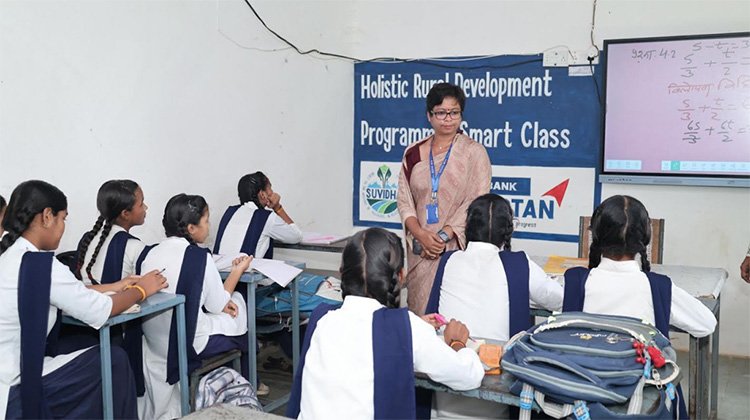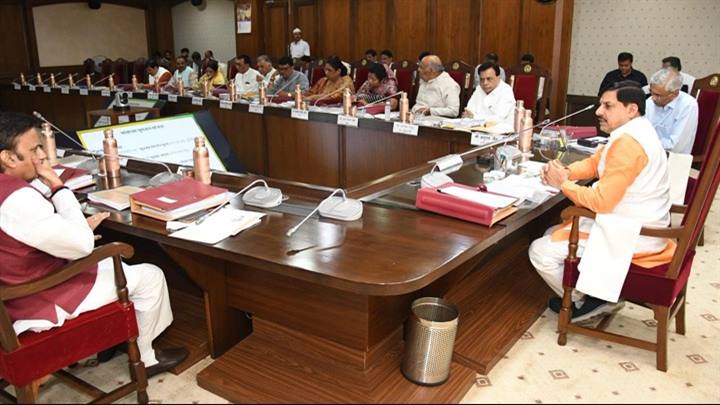Impact in 38 out of 55 districts in the state, including all 8 Aspirational Districts
HDFC Bank, India’s largest private sector bank, through its CSR arm Parivartan, has positively impacted over 63.72 lakh lives in Madhya Pradesh to date.

Bhopal, Madhya Pradesh : HDFC Bank, India’s largest private sector bank, through its CSR arm Parivartan, has positively impacted over 63.72 lakh lives in Madhya Pradesh to date. The Bank has been active in the state since 2015, covering 38 of Madhya Pradesh’s 55 districts.
Under Parivartan, the Bank has adopted six focus areas of:
Rural Development
Promotion of Education
Skill Training & Livelihood Enhancement
Healthcare & Hygiene
Financial Literacy & Inclusion
Natural Resource Management
In Madhya Pradesh, Rural Development, Promotion of Education, and Skill Training & Livelihood Enhancement have driven the most significant impact. Over 69,000 farmers have benefitted, along with 26,000 students and 17,000 trained individuals.
CSR Footprint in Madhya Pradesh
HDFC Bank’s Parivartan programme has built a strong and sustained presence across Madhya Pradesh, covering 38 of the state’s 55 districts through a mix of ongoing, and closed projects. The Bank has successfully implemented projects in all of the state’s Aspirational Districts, with completed nitiatives in Barwani, Chhatarpur, Damoh, Guna, Khandwa, Rajgarh, and Vidisha, and continuing to efforts in Barwani, Guna, Khandwa, and Singrauli.
Overall, 33 districts have seen projects successfully completed, while 17 districts currently have active interventions underway. Upcoming projects are planned in Tikamgarh and Ujjain.
The Bank’s flagship Holistic Rural Development Programme, which focuses on integrated interventions across all 6 focus areas, has impacted 165 villages across Alirajpur, Ashoknagar, Bhopal, Chhindwara, Dewas, Indore, Khargone, and Sehore.
Additionally, Focused Development Programmes, where the Bank carries out specific interventions under any one or two of the key focus areas in atargeted geographical area, have been implemented in the districts of Agar Malwa, Balaghat, Bhopal, Chhatarpur, Guna, Gwalior, Harda, Indore, Khandwa, Khargone, Mandla, Mandsaur, Panna, Satna, Singrauli, and Umaria. & At HDFC Bank, we believe CSR is not a one-size-fits-all approach. Through Parivartan, we design and implement need-based interventions that respond to the unique challenges of each region. Our work in
Madhya Pradesh reflects this philosophy, from supporting farmers with sustainable agriculture to strengthening education, skilling and infrastructure. We remain committed to playing a small part in
fostering inclusive growth and creating lasting impact at the grassroot level,” said Ms Nusrat Pathan, Head CSR, HDFC Bank. & We are dedicated to offering a comprehensive range of banking services across Madhya Pradesh, ensuring accessibility for all. As a socially responsible corporate citizen, HDFC Bank is equally focused on bringing meaningful change to individuals and families,” said Mr Prateek Sharma, Branch Banking Head, Madhya Pradesh, HDFC Bank.
HDFC Bank was among the top CSR spenders in India for the financial year ended March 2025. As of 31st March 2025, the Bank had spent Rs. 1,068 crore on CSR initiatives nationwide. Under the Parivartan programme, the Bank has impacted over 10.56 crore lives across the country.
KEY INTERVENTIONS IN MADHYA PRADESH
Water Conservation
Large parts of the state face recurring water scarcity due to erratic rainfall, sloped and degraded land and overdependence on rainfed farming. Some pockets also struggle with poor drinking water quality from high iron and arsenic levels. These challenges directly affect agriculture, health and livelihoods.
In Madhya Pradesh, Parivartan interventions begin with securing water. Over 2000 water conservation structures have been constructed bringing 37000 acres of land under irrigation. Projects in districts like Ashoknagar, Sehore, and Khargone combine land treatment with micro-irrigation, solar water pumps, and masonry stop dams to improve agricultural productivity. In water-quality affected areas like Khargone, solar powerd Jal Minars with filtration units are providing safe drinking water, while watershed initiatives in Singrauli and Umaria are replenishing groundwater, reducing erosion and ensuring access for both farming and daily life.
Empowering Farmers through Sustainable Agriculture in Ashoknagar With reliable water supply, farmers are being trained to adopt improved techniques in farming. In the Chanderi block of Ashoknagar, HDFC Bank Parivartan, in partnership with Abhyudaya Sansthan, is facilitating a transformation in rural livelihoods. Farmers who previously struggled to make ends meet are now seeing income increases of 30–40% through sustainable farming, cash crop cultivation, modern techniques, and organic practices.
This initiative has brought irrigation to 4,000 acres, provided clean energy to 15 villages, and planted 5,000 trees to reduce carbon emissions. Over 1,800 farmers and their families are benefitting from the formation of 75 women-led community enterprises, 65 community-based institutions, and five smart schools.
Advancing Farmer Incomes through Multi-Tier Farming in Sehore In 20 villages across Sehore, HDFC Bank Parivartan, in collaboration with Arpan Seva Sansthan, is introducing multi-tier farming techniques that are reshaping agriculture. This method allows fruits and vegetables to be grown together on small plots, ensuring continuous yield and stable income throughout the year.
The system is cost-effective, ideal for small farms, and compatible with micro-irrigation. Farmers have been trained in seed selection, organic composting, and efficient water use. As a result, seasonal
incomes have risen from Rs. 9,000 to Rs. 1,20,000.
Other Initiatives
In Khalwa Block of Khandwa district, a moringa plantation initiative is combating malnutrition while providing farmers with a profitable crop for value-added products. This dual focus on agricultural
income and health signifies Parivartan’s integrated approach.
In Malwa and Guna, livelihood initiatives including dairy cooperatives and millet-based enterprises are enabling small entrepreneurs to secure sustainable incomes.
Building on this link of between livelihood and local strengths, HDFC Bank has also supported non-farm economic activities like handloom weaving. In Pran, solar-powered handlooms have revived the weaving of Maheshwari and Chanderi sarees. Women are being provided with modern facilities, market access and higher earnings.





















